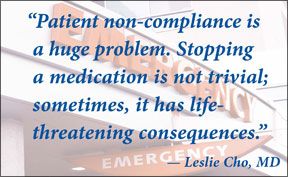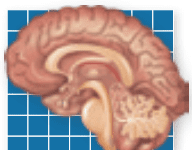Heres a common scenario: You already take medications to regulate your heartbeat and lower your cholesterol, and your doctor prescribes an additional drug to bring down your blood pressure. After taking the medication for a few days, you feel dizzy and nauseous. Do you stop taking the medication and tell your doctor at your next visit in three weeks, or call your doctor and report your symptoms but keep taking the medication? Far too many patients choose the first option, according to Leslie Cho, MD, director of preventive cardiology at Cleveland Clinic and editor-in-chief of Heart Advisor. "Many patients stop taking medications without talking to their doctors first," she says. "Patient non-compliance is a huge problem. Stopping a medication is not trivial; sometimes, it has life-threatening consequences." Dr. Cho provides this example: "A patient of mine had a stent put in to open a coronary artery, and I prescribed clopidogrel (Plavix), a medication which prevents blood from clotting inside stents. But the patient stopped taking the Plavix because he said it caused stomach upset-a week later, his stent was blocked with a blood clot, and he required emergency treatment at 2 a.m."
To continue reading this article or issue you must be a paid subscriber.
Sign in






